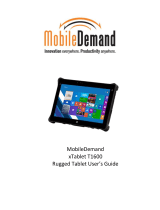
6 Using the microSD card reader ...................................................................................................................... 16
Inserting a microSD card ..................................................................................................................................... 16
Removing a microSD card .................................................................................................................................... 17
7 Managing power .......................................................................................................................................... 18
Initiating and exiting Sleep .................................................................................................................................. 18
Manually initiating and exiting Sleep ................................................................................................ 18
Setting password protection on wakeup (exiting Sleep) .................................................................. 18
Using the power meter and power settings ........................................................................................................ 19
Running on battery power ................................................................................................................................... 19
Factory-sealed battery ...................................................................................................................... 19
Finding battery information .............................................................................................................. 19
Conserving battery power ................................................................................................................. 20
Identifying low battery levels ........................................................................................................... 20
Resolving a low battery level ............................................................................................................ 20
Resolving a low battery level when external power is available ................................... 20
Resolving a low battery level when no power source is available ................................. 20
Running on AC power ........................................................................................................................................... 20
Shutting down (turning o) the tablet ................................................................................................................ 21
8 Maintaining your tablet ............................................................................................................................... 22
Updating programs and drivers .......................................................................................................................... 22
Cleaning your tablet ............................................................................................................................................. 22
Cleaning procedures .......................................................................................................................... 23
Cleaning the display ........................................................................................................ 23
Cleaning the sides or back .............................................................................................. 23
Traveling with or shipping your tablet ................................................................................................................ 24
9 Securing your tablet and information ............................................................................................................ 25
Using passwords .................................................................................................................................................. 25
Setting Windows passwords ............................................................................................................. 25
Setting Setup Utility (BIOS) passwords ............................................................................................. 26
Using Internet security software ......................................................................................................................... 26
Using antivirus software ................................................................................................................... 26
Using rewall software ..................................................................................................................... 27
Installing software updates ................................................................................................................................. 27
Securing your wireless network .......................................................................................................................... 27
Using TPM (select products only) ........................................................................................................................ 27
Backing up your software applications and information .................................................................................... 28
viii






















